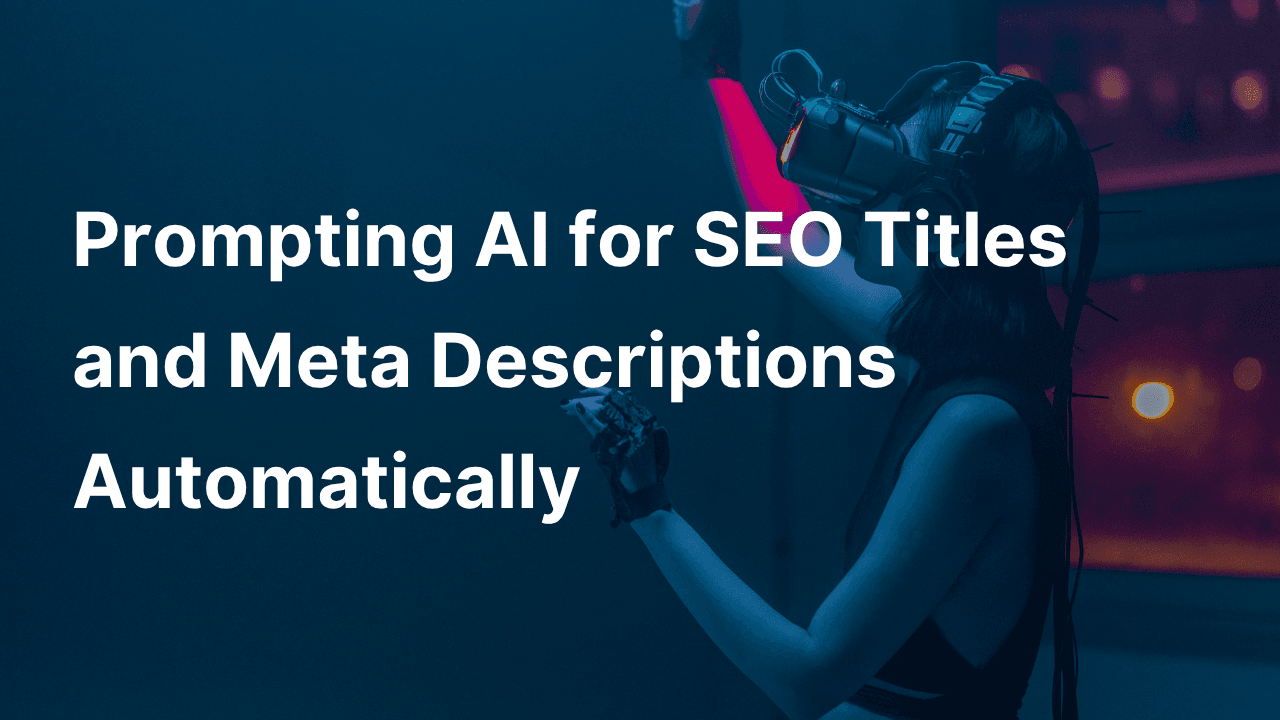Prompting AI for SEO Titles and Meta Descriptions Automatically

In today’s fast-moving digital world, your content isn’t complete until it’s optimized for search engines. The best-written article can stay invisible if your SEO title and meta description don’t attract clicks. But writing those manually for every page or product can be time-consuming — especially when managing a large website or eCommerce store.
That’s where AI-powered prompting steps in. With the right prompts, you can teach AI to automatically generate SEO titles and meta descriptions that are not only keyword-rich but also human-sounding and click-worthy.
Why SEO Titles and Meta Descriptions Matter
Think of your SEO title and meta description as your digital first impression. They’re the text that shows up in search results — the short preview that convinces users to click your link instead of another.
A strong title boosts click-through rates (CTR), and an effective meta description gives users a clear reason to visit your page. Together, they act as mini-advertisements for your content.
But writing hundreds (or even thousands) of them manually can slow your workflow — and that’s why more marketers and SEO professionals are turning to AI automation.
How AI Can Generate SEO Titles and Descriptions
AI tools like ChatGPT, Jasper, Copy.ai, or Writesonic can analyze a page’s content, extract key themes, and generate optimized titles and meta descriptions with a simple prompt.
Prompt Example:
“Analyze this product description and generate an SEO-friendly title and meta description. Focus on the keyword ‘vegan skincare serum.’ Keep the title under 60 characters and the meta description under 160 characters.”
In response, AI might produce:
Title:
“Hydrating Vegan Skincare Serum – Glow Naturally”
Meta Description:
“Discover our vegan skincare serum with plant-based hydration for smooth, radiant skin. Perfect for all types. Shop now!”
That’s a clean, keyword-rich, and human-readable result — generated in seconds.
The Power of Smart Prompting
Not all AI results are equal. What determines quality is how you prompt the AI. If you want consistent, SEO-ready results, your prompt must include:
- Primary Keyword – The main term you’re targeting.
- Character Limit Instructions – Helps the AI stay within Google’s display limits.
- Tone or Brand Voice – Tells AI how your brand “sounds.”
- Call-to-Action (CTA) – Encourages engagement or conversion.
Example of a Refined Prompt:
“Generate an SEO-optimized title and meta description for a Shopify product page selling handmade candles. Use the keyword ‘soy wax candle,’ keep the tone cozy and inviting, title under 60 characters, meta under 155, and include a light call to action.”
By repeating structured prompts like this, your AI will start to produce SEO content that feels perfectly tailored to your brand.
Automating the Process
If you manage dozens of product pages or blog posts, manually prompting AI for each one might still take time. The next step is automation.
You can integrate AI with your CMS (like Shopify, WordPress, or Webflow) using APIs or automation tools like Zapier, Make, or custom scripts.
For example:
- Whenever you publish a new blog post, AI automatically reads the title and content.
- It then generates a matching SEO title and meta description.
- The system pushes them back into your CMS — fully optimized, instantly.
This workflow can save hours every week and ensure that every page on your site stays optimized without manual effort.
Maintaining Brand Voice in AI-Generated SEO
While AI is fast, it’s easy to lose your brand’s personality if you don’t guide it. That’s why it’s important to teach your AI your brand tone, preferred adjectives, and structure.
For example:
“Always write titles that sound elegant and trustworthy. Use words that highlight luxury and craftsmanship.”
By maintaining these parameters, your AI-generated SEO snippets remain on-brand while staying optimized for search intent.
Benefits of AI-Powered SEO Prompting
- Speed & Efficiency: Generate hundreds of optimized snippets in minutes.
- Consistency: Maintain tone and keyword strategy across all pages.
- Scalability: Perfect for large eCommerce or blog sites.
- A/B Testing: Quickly experiment with multiple meta versions for better CTR.
- Cost-Effective: Replace hours of manual SEO writing with automated workflows.
As search algorithms become more context-aware, AI-driven SEO writing ensures your content remains competitive and human-centered.
The Future: AI SEO Agents and Dynamic Meta Generation
We’re heading toward a future where AI SEO agents dynamically update titles and descriptions in real time based on search trends, user behavior, and click performance.
Imagine your meta descriptions adjusting automatically when a keyword trend changes — without you lifting a finger.
That’s the next evolution of AI-driven SEO — and prompting is the foundation for building it today.
Final Thoughts
AI won’t replace your SEO strategy — it’ll amplify it. With the right prompts, you can train AI to handle repetitive tasks like writing titles and meta descriptions, freeing up your time for creative and analytical work.
Prompting AI effectively is not just about saving time — it’s about scaling your SEO intelligently, maintaining brand consistency, and staying ahead in a search landscape that changes faster than ever.
In short: when you learn to prompt AI well, you’re not just automating SEO — you’re evolving it.